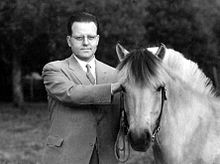Gabriel Hauge (/ˈhaʊɡi/ HOW-ghee; March 7, 1914 – July 24, 1981) was a prominent American bank executive and economist. Hauge served as assistant to the president for economic affairs during the administration of Dwight D. Eisenhower.[1]
Gabriel Hauge | |
|---|---|
 | |
| Born | March 7, 1914 |
| Died | July 24, 1981 (aged 67) |
| Education | Concordia College Harvard University |
| Occupation(s) | Economist, educator, author, bank executive |
| Political party | Republican |
Background edit
Gabriel Hauge was born in Hawley, Minnesota. He was the son of Reverend Søren G. Hauge, a Lutheran minister and an immigrant from Sandane in Sogn og Fjordane, Norway. Hauge earned a B.A. from Concordia College in 1935, an M.A. from Harvard University in 1938, and his Ph.D. from Harvard University in 1947.[2]
Career edit
From 1938 to 1940, Hauge was an economics instructor at Harvard University. In 1939, he also worked at the Federal Reserve Bank of New York. From 1940 to 1942, he was a professor of economics at Princeton University. During World War II, he was an active member of the United States Navy Reserve. He served as a gunnery officer for a 5-inch battery on the USS California (BB-44) at the Battle of the Surigao Strait.[3] From 1947 until 1950, Hauge was an economist with the New York State Banking Department. From 1950 to 1952, he was an assistant editor of Business Week magazine.
Hauge was an economic advisor to the 1948 presidential campaign of Thomas Dewey. During the 1952 presidential campaign, he was on Dwight D. Eisenhower's campaign staff as a research director for Citizens for Eisenhower. Following the presidential election of 1952, Hauge served as assistant to the president for economic affairs from 1953 to 1958.[4][5]
In 1958, Hauge joined Manufacturers Trust Company. In 1961, Manufacturers Trust Company merged with Central Hanover Bank & Trust Company (Hanover Trust). From 1964 until 1981, Hauge served as a director of the Council on Foreign Relations. In 1970, he became chairman of the Board of Directors of Manufacturers Hanover Trust Company.[6][7] He was a member of the steering committee of the Bilderberg Group.[8]
Selected works edit
- Freedom and the Economic Role of Government (1957)
- The U.S. Economy: Problems and Promise (1960)
- Is the Individual Obsolete? (Benjamin F. Fairless memorial lectures) (1964)
- The International Capital Market and the International Monetary System (1978)
References edit
- ^ "Gabriel Hauge, Banker, dies; was an Adviser to Presidents". The New York Times. July 25, 1981.
- ^ "Personnel: Smooth Shift". Time. January 4, 1963.
- ^ Unpublished memoir, Dwight D. Eisenhower Presidential Library, edited by George Bookman.
- ^ United States Government Organization Manual, 1955–1956. Federal Records Division, National Archives and Records Administration. Washington, D.C., Government Printing Office. p. 66.
- ^ "The Administration: Against the Winds". Time. July 28, 1958.
- ^ "Historical Roster of Directors and Officers". Council on Foreign Relations.
- ^ "Manufacturers Hanover President Named Chairman". The New York Times. September 16, 1970.
- ^ "Former Steering Committee Members". Bilderberg Group. Archived from the original on June 30, 2009. Retrieved February 8, 2014.
External links edit
- Records of Gabriel Hauge, Dwight D. Eisenhower Presidential Library
- Papers of George B. Bookman (Rough Draft of Gabriel Hauge's Unpublished Memoirs), Dwight D. Eisenhower Presidential Library
- The Papers of Dwight David Eisenhower
- A film clip "Longines Chronoscope with Gabriel Hauge" is available for viewing at the Internet Archive